Catholicism
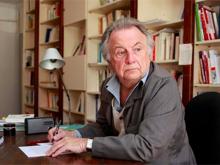
In France’s highly secularized society, anyone who talks about religion and politics risks being written off as a closet demagogue, a Catholic traditionalist, or a potential radical Islamist. Officially, the twain should never meet.

China is experiencing “one of the great religious revivals of our time,” Johnson writes. “Across China, hundreds of temples, mosques, and churches open each year, attracting millions of new worshippers. … Faith and values are returning to the center of a national discussion over how to organize Chinese life.
“This is not,” he continues, “the China we used to know.”
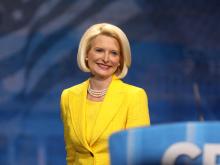
According to CNN, the decision to nominate Gingrich has already been made, but the announcement is pending approval from the Office of Government Ethics. Earlier this year, Newt Gingrich confirmed his wife was in the running for the job. The White House declined comment on May 15.
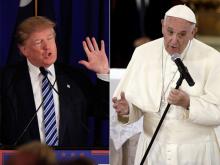
During his early morning visit to the Vatican, Trump will also meet the secretary of state, Cardinal Pietro Parolin, and Archbishop Paul Gallagher, who is responsible for the Holy See’s relations with states.
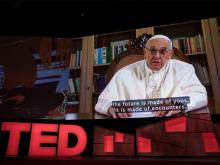
The talk — a surprise for all in the audience — recapitulated the key themes of the Argentinian pope’s view of the human person: We are all related and interconnected; scientific and technological progress must not be disconnected from social justice and care for the neighbor; and that the world needs tenderness.
I am a scholar of modern Catholicism and its relations with the world of today. From my perspective, there are two essential elements of this talk that are important to understand: the message of the pope and his use of the media.
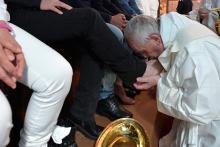
"We are all sinners. We all have defects," the pope told the inmates, in an improvised sermon broadcast by Vatican Radio.
By washing their feet, Francis told them, he was willing to do "the work of a slave in order to sow love among us". He urged them to help each other.
Two of the 12 are serving life sentences, and the others are due to be released between 2019 and 2073.
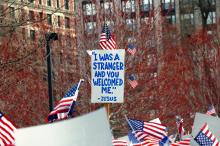
Since it was unveiled last week, President Trump’s proposed budget has been widely denounced as “immoral” and downright “evil” for boosting defense spending by billions while demanding drastic cuts to vital aid programs.
Yet if liberals and some conservatives are upset about cuts to programs that help ensure clean drinking water, give financial aid to low-income college students, and even help support Meals on Wheels — which delivers nearly a million meals a day to the sick and elderly — would Jesus have a problem with slashing assistance to the needy?
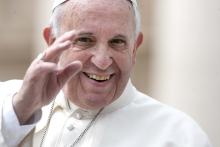
Despite criticism from conservative opponents who question his approach to church doctrine and his reform of the Vatican Curia, the pope said he had never lost his peace of mind.

“The effort to keep the church from stopping this sort of thing is shocking,” she added. “It is about male power and male image, not people’s stories. The real trouble is they have defined their power as spiritual leadership and they don’t have a clue about spiritual life.”
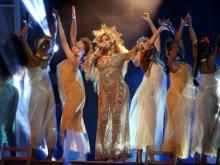
From the depiction of the divine mother in Beyonce’s imagery to Busta Rhymes’s jab at President Trump’s “Muslim ban,” religion took center stage at the 2017 Grammy Awards.
As he accepted the first award – for best new artist – of the televised broadcast on Feb. 12, Chance the Rapper declared:
“Glory be to God. I claim this victory in the name of the Lord.”
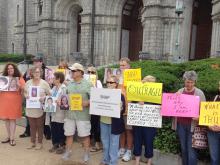
“We’re really not talking about anything changing,” said Mary Ellen Kruger, chair of the five-member board of directors of SNAP. “Our everyday mission is the same: helping survivors, protecting kids through education, and exposing predators. So that’s not changed.”
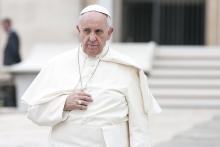
In a powerfully worded message, the pope said he wanted to encourage media professionals to engage in “constructive forms of communication that reject prejudice” and help create a world of “realism and trust.”
The pope’s message came days after President Trump launched a bitter attack on news media over its reporting on the size of his inauguration crowd.
In his message, Francis said he was concerned about the focus on “bad news” that included “wars, terrorism, scandals and all sorts of human failure” by a media industry that thinks good news doesn’t sell and where the “tragedy of human suffering and the mystery of evil” easily become entertainment.
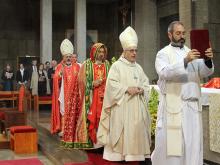
While the Iraqi conflict is far from over — a battle is now raging in the strategic city of Mosul, although government forces have gained ground against Islamic State militants — Mirkis focused many of his remarks on how to heal his deeply divided country.
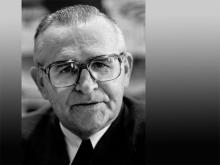
Brazilian Cardinal Paulo Evaristo Arns, one of the most important figures in modern Brazil, died on Dec. 14 in Sao Paulo. He was 95.
Known as Dom Paulo, he was appointed bishop in 1966 and served as archbishop of the Sao Paulo Archdiocese from 1970 to 1998. But he was better known as the “people’s bishop,” and embodied the progressive church movement in South America.

Winter isn’t coming — it’s already here. With it comes the hope — if not the time — to curl up under the covers, or by the fire, and read a good book. Here are seven titles you won’t find on the religion shelf at the bookstore, or library, but that nonetheless use religion and spirituality themes to propel the story.

Summer’s gone, and with it the breezier reading of the beach and the hammock. In its place comes a more serious reading list — more literary, less lightweight. Here are seven books where religion plays a role — though not a proselytizing or a self-help one — to read between the falling leaves.

For me, as a mother, the incarnation becomes tangible thus: “You will conceive and give birth to a son, and you are to call him Jesus” and [not listed in Gabriel’s announcement] he’ll be brutally killed in front of you. It becomes tangible when I again picture this mother at the foot of a cross where her son hangs. He is the savior of the world, carrying out God’s perfect plan through his death and resurrection, yes. … But he is her baby.
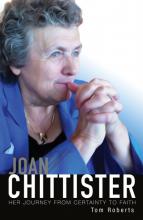
MANY KNOW Benedictine Sister Joan Chittister as a prophetic spiritual writer and an engaging speaker; others call to mind her sister-leadership, her feminism, and her defiance of the Vatican. What Tom Roberts’ startling new biography uncovers, with the full cooperation of Sister Joan, are the horrors of a childhood filled with violence and poverty and the vivid details of her growth as a spokesperson for women’s equality in the Catholic Church.
The book’s three parts each deal with a phase in Chittister’s spiritual growth. The early years, with harrowing accounts of protecting her mother from a brutal and alcoholic stepfather and entering an Erie Benedictine community still steeped in old-world traditions, conclude with Chittister receiving her Ph.D. from Penn State, a first for her order.
Part two chronicles the tumultuous middle years when religious communities everywhere were adapting to a radically changing world. Chittister grew in critical consciousness about the role of women in the church and served three terms as prioress of her order, helping her community to move from its traditional vocation of teaching to serving a changing neighborhood. Their projects, under the umbrella term of peacemaking, took the form of urban gardens, art workshops, afterschool programs, peace centers, houses of hospitality, and soup kitchens, and eventually to the formation of online communities of monastic spirituality. For those who haven’t read Chittister’s own writing on these years, Roberts could have included more information on pre-Vatican II convent life here.
Part three finds Chittister moving beyond the community of U.S. sisters to worldwide leadership, ably assisted by her lifelong friend Sister Maureen Tobin. Chittister traveled on peacemaking journeys to Palestine and Israel, worked in Haiti and the Philippines, and took part in several worldwide conferences, including the 1995 U.N. World Conference on Women in Beijing and an ecumenical conference in Nairobi. All this while still plagued by the ravages of childhood polio!
In 2001, Chittister was invited to speak at the first international conference of Women’s Ordination Worldwide, to be held in in Dublin. Vatican officials ordered her prioress, the late Christine Vladimiroff, to “forbid and prohibit” Chittister’s participation. Roberts details the courage of Vladimiroff and the community as they collectively resisted the Vatican in support of Chittister.
When Chittister addressed the Dublin conference about discipleship, she asked “What do the people really need?” answering that “they need the sacred, not the sexist ... more prophets of equality, not more pretenders to a priesthood of male privilege. They need discipleship, not canonical decrees.” In her assertion that Christian discipleship will, sooner or later, “tumble a person from the banquet tables ... to the most suspect margins of both church and society,” she foreshadowed some of Pope Francis’ wisdom. She begged that the question of women as priests be seriously considered in papal circles, lamenting that it had not yet happened. (It still has not yet happened.)

Bill Maher is known for his often vitriolic rhetoric against religion, especially Islam. But the comedian was actually raised Catholic. When Maher stopped by the Late Show to chat with Stephen Colbert, America’s most famous Catholic invited him to give Catholicism another try.
Their conversation was clearly tongue-in-cheek, but you can certainly feel some tension.
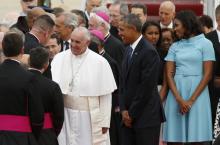
Pope Francis touched down in Washington on Sept. 22 after a historic visit to Cuba, the first Latin American pope in history on his first trip to the U.S. He comes “as a migrant,” as a top papal aide put it, on a six-day visit filled with great expectations for the popular pontiff but also numerous challenges.
Among them are the sharp, even personal criticisms directed at him from American conservatives upset with his thundering pronouncements against economic injustice and climate change, and from conservative Catholics upset that his focus on the poor and marginalized is undercutting the Catholic Church’s focus on battling abortion and gay marriage.
Francis himself addressed those concerns even before he landed, telling reporters aboard the chartered Alitalia jet that everything he has said is in keeping with church teaching and laughing at repeated accusations that he is a communist or radical left-winger:
“I am certain I have never said anything more than what is in the social doctrine of the church,” Francis said, according to Catholic News Service .
“I follow the church and in this I do not think I am wrong.